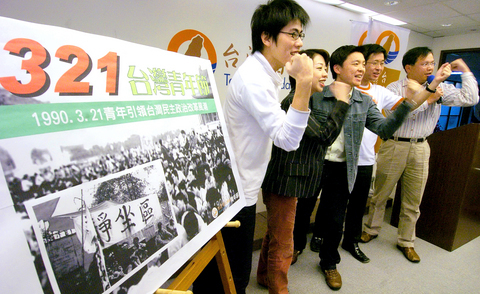The Taiwan Solidarity Union (TSU) yesterday urged the government to change the date of Youth Day from March 29 to March 21, the day in 1990 that former president Lee Teng-hui (
"Youth Day is the day that Chinese revolutionaries initiated a rebellion against the Qing Dynasty in 1911, before the Republic of China (ROC) was built," TSU's director of the Department of Youth Development Wang I-chou (王義州) said in a news conference held yesterday afternoon at the TSU's headquarters. "However, the ROC doesn't exist anymore for young people living in Taiwan. The origin of this red-letter day has nothing to do with them. We think it makes no sense that the central government still holds services to pay homage to Chinese revolutionaries."
In 1954, the Chinese Nationalist Party (KMT) government set March 29 as the nation's Youth Day to commemorate the "72 Martyrs" who died in an unsuccessful revolt against the Qing Dynasty launched in Guangzhou in 1911.

PHOTO: WANG MIN-WEI, TAIPEI TIMES
Wang said that the TSU will ask its legislative caucus to propose a motion to change Youth Day from March 29 to March 21, a significant day that triggered a series of political reforms.
In March 1990, over 300,000 college students launched a sit-in demonstration at CKS Memorial Hall to ask for direct election of the president and vice president and an over-all re-election of National Assembly representatives. On March 21, Lee, then president, received the student representatives in the Presidential Office and reacted positively to their demands.
"Taiwanese young people created history with their actions and ignited the reform on March 21," Wang said. "We think that day should be set as Taiwan's Youth Day."
Chao Tien-lin (
Meanwhile, TSU Secretary-General Chen Chien-ming (陳建銘) said yesterday that the party has issued an order asking all TSU members to help mobilize at least 100,000 people to join in Saturday's march. Chen said that Lee will give a speech on that day but might not join in the parade because of security concerns.

Trips for more than 100,000 international and domestic air travelers could be disrupted as China launches a military exercise around Taiwan today, Taiwan’s Civil Aviation Administration (CAA) said yesterday. The exercise could affect nearly 900 flights scheduled to enter the Taipei Flight Information Region (FIR) during the exercise window, it added. A notice issued by the Chinese Civil Aviation Administration showed there would be seven temporary zones around the Taiwan Strait which would be used for live-fire exercises, lasting from 8am to 6pm today. All aircraft are prohibited from entering during exercise, it says. Taipei FIR has 14 international air routes and

Taiwan lacks effective and cost-efficient armaments to intercept rockets, making the planned “T-Dome” interception system necessary, two experts said on Tuesday. The concerns were raised after China’s military fired two waves of rockets during live-fire drills around Taiwan on Tuesday, part of two-day exercises code-named “Justice Mission 2025.” The first wave involved 17 rockets launched at 9am from Pingtan in China’s Fujian Province, according to Lieutenant General Hsieh Jih-sheng (謝日升) of the Office of the Deputy Chief of the General Staff for Intelligence at the Ministry of National Defense. Those rockets landed 70 nautical miles (129.6km) northeast of Keelung without flying over Taiwan,

City buses in Taipei and New Taipei City, as well as the Taipei MRT, would on Saturday begin accepting QR code payments from five electronic payment providers, the Taipei Department of Transportation said yesterday. The new option would allow passengers to use the “transportation QR code” feature from EasyWallet, iPass Money, iCash Pay, Jkopay or PXPay Plus. Passengers should open their preferred electronic payment app, select the “transportation code” — not the regular payment code — unlock it, and scan the code at ticket readers or gates, General Planning Division Director-General Liu Kuo-chu (劉國著) said. People should move through the

The Ministry of National Defense (MND) today released images of the military tracking China’s People's Liberation Army (PLA) movements during the latest round of Chinese drills around Taiwan. The PLA began "Justice Mission 2025" drills today, carrying out live-fire drills, simulated strikes on land and maritime targets, and exercises to blockade the nation's main ports. The exercises are to continue tomorrow, with the PLA announcing sea and air space restrictions for five zones around Taiwan for 10 hours starting from 8:30am. The ministry today released images showing a Chinese J-16 fighter jet tracked by a F-16V Block 20 jet and the